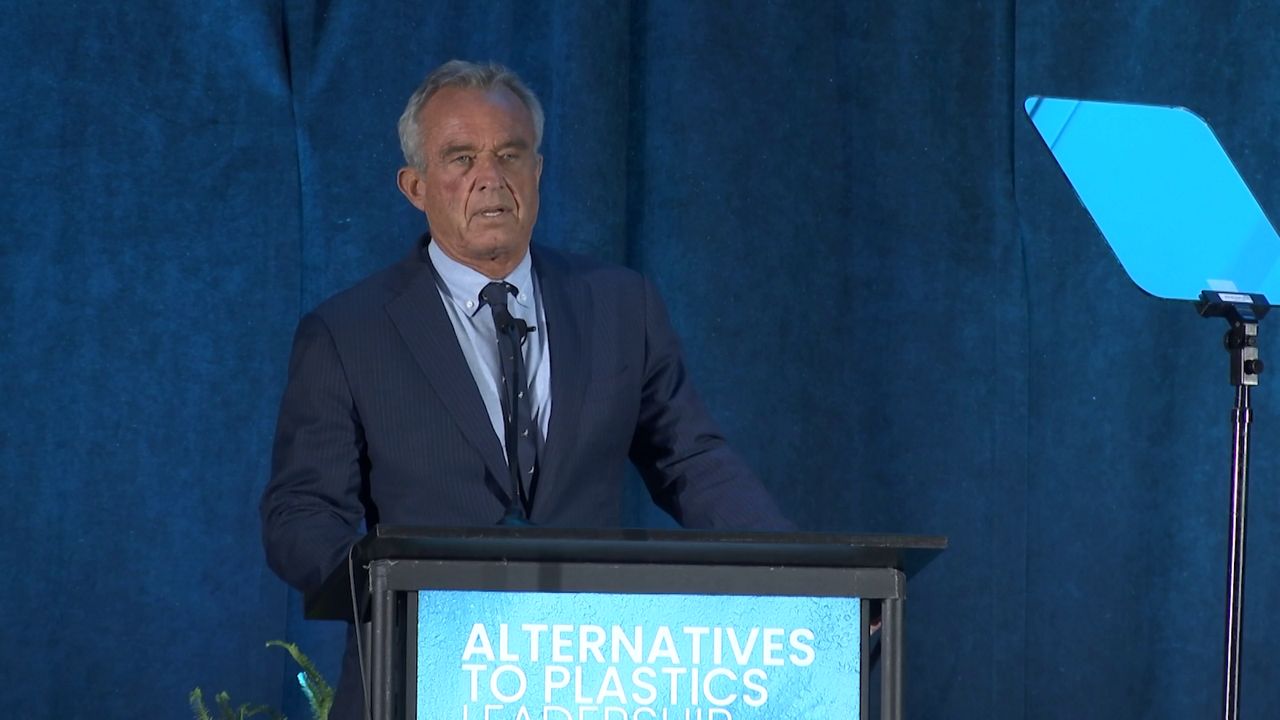RALEIGH, N.C. — For football fans, there might be no greater time of year than fall.
As for players, the love of the game can haunt them later in life. Often it shows up as CTE, Chronic Traumatic Encephalopathy, a traumatic brain disease affecting many retired NFL players due to blows to the head.
What You Need To Know
- Kelsey Chittick started her book tour in Raleigh. The book is titled “Second Half: Surviving Loss and Finding Magic in the Missing”
- She writes about discovering her late husband’s CTE (Chronic Traumatic Encephalopathy). Chittick’s husband, Nate Hobgood-Chittick, played six seasons in the NFL
- She is a writer, comedian and inspirational speaker
- She was a swimmer at UNC when she met her husband, who played defensive lineman for the football team
Nate Hobgood-Chittick's wife, Kelsey Chittick, can attest to that.
She talked about her husband and their life together in her book called, “Second-half: Surviving Loss and Finding Magic in the Missing."
During a recent trip to North Carolina in September to launch her book tour, the author discussed what her journey to find peace and answers about her husband has taught her.
She is a comedian, writer, inspirational speaker and wife to a former NFL defensive tackle who died in 2017. The author often used humor to break the ice.
“I appreciate y’all taking time out on a Monday. I would never go out on a Monday. I think it’s absurd that people have come out on a Monday," she said.
During her book premiere in Raleigh at her best friend’s boutique clothing store, Chittick delved into what readers can find in her book.
Her late husband died from a massive heart attack while jumping on the trampoline with their two children, Jack and Addison, near their home in southern California. It happened nearly four years ago.
"When kids are in pain, it's really hard to let them be in pain," she said.
In a long response, and one she often painted in great detail in the book, Chittick described to the audience how her children felt after their dad was gone.
She recalled moments when she tried to focus on what her husband was like as a man. The mom of two said she did her best to point out to her children they were lucky to have him in their lives. At the time, they were still in mourning.
What she would learn is that they simply wanted her to be present with them as they cried.
"They told me, ‘It's awful. We're miserable. We want to die.’ And at some point, I'm like, 'Oh my God. I'm not listening to them.' I couldn't stand watching them cry," she said.
This powerful realization brought mothers in attendance to tears.
“They just wanted me to sit with them while they cried,” Chittick said. “I write about that, and then I write about that he [Hobgood-Chittick] did have CTE.”
Chittick knows that now because she asked experts at Boston University’s CTE Center to study the 42-year-old’s brain.
In her book, Chittick said experts discovered her husband's brain tissue showed signs of Stage II and III CTE.
“I struggle with talking about that so much because football gave us so much and it gave me some of the best men that I know,” Chittick said.
According to the BU Center, CTE comes with a range of symptoms including memory loss, confusion, aggression, and for some, being suicidal. Chittick recalled her husband showing signs of anger six months before he died.
“I messed up a cable bill and he was like ‘What the hell is wrong with you?’ I was like, ‘Whoa.’ I had never heard him be nasty,” Chittick said.
Joy came long before the grief when the pair met in Chapel Hill at the University of North Carolina. On a walk around the campus a day before her book launch, she walked alongside the stadium where Hobgood-Chittick played his games.
Chittick pointed to the stadium and remembered where he practiced. She was a swimmer at UNC when the two dated. He was a defensive lineman for the Tar Heels who would go on to play for five NFL teams over six seasons.
“People always say, ‘What would you want to change?’ I just don’t think you can take parts of your life and redo them because you would change all the dominoes that lead after that,” Chittick said.
She says she wouldn’t take back watching him suit up for the Rams, Chiefs and a few others. She felt certain though, he wouldn’t want to leave his children fatherless at 9 and 12 years old.
“I think I would be remiss if I didn’t mention why he was gone. I think it’s a conversation that needs to be started. It doesn’t mean that football is all bad. There are so many great parts to it but we don’t want men to be dying and for kids to not have dads,” she said.
Chittick said her book and her husband’s life highlights a lot of men suffering from the disease. She believes football creates a pipeline of players who can someday face severe chronic trauma after a lifetime of putting injuries on the shelf.










